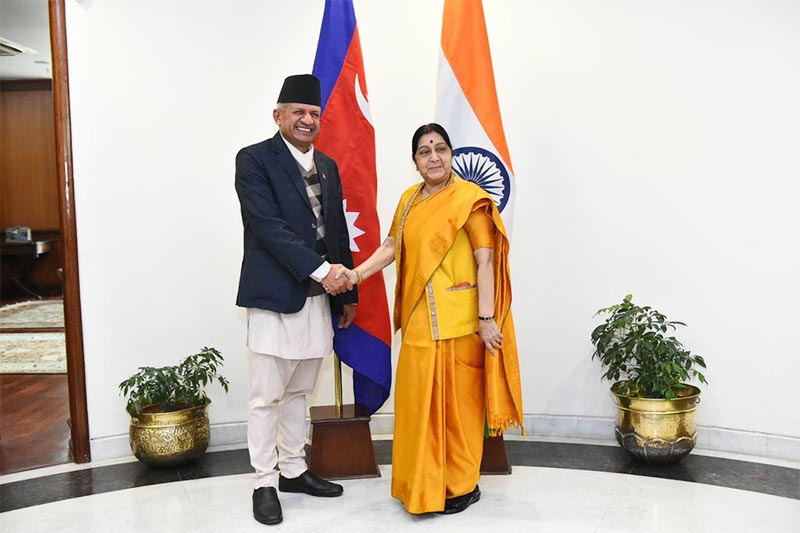Gyawali, Swaraj review bilateral projects
- Inundation of Nepal’s plains was another agenda at the meeting
Kathmandu, January 10
Visiting Nepali Minister of Foreign Affairs Pradeep Kumar Gyawali today held a meeting with the Minister of External Affairs of India Sushma Swaraj at the latter’s office in New Delhi.
During the meeting, the two leaders exchanged views on various aspects of Nepal-India relations while reviewing the progress of ongoing bilateral cooperation projects. They noted with satisfaction the progress made in several areas and underscored the need to continue the momentum.
The two ministers recalled the exchange of high-level visits in recent times and appreciated that these visits had contributed to enhancing the age-old bilateral relations on the basis of equality, mutual trust, respect and mutual benefits, according to a statement issued by the Ministry of Foreign Affairs.
Another issue figuring in the lunch meeting, which was preceded by a brief one-on-one meeting between the two leaders, was inundation in Nepal’s southern plains. The two agreed that recommendations by a joint team that had studied the floods should be implemented swiftly
The two ministers also reviewed progress achieved on the three transformative initiatives launched in 2018 in the areas of agriculture, railways and inland waterways as well as the pace of implementation of ongoing bilateral development and connectivity projects. The two ministers reiterated their commitment to maintain the new momentum and to further strengthen the traditionally close and friendly ties between the two countries, the Indian Ministry of External Affairs said in a statement.
During the meeting, both ministers agreed to hold the fifth meeting of the Nepal-India Joint Commission in Nepal at an earliest convenient date. Gyawali extended an invitation to Swaraj to visit Nepal to co-chair the next meeting of the Joint Commission, and Swaraj accepted the invitation, read the MEA statement.
Swaraj had hosted the luncheon in honour of the visiting Nepali minister.
Gyawali arrived in New Delhi this morning to participate in the fourth edition of Raisina Dialogue as one of the keynote speakers. He will return home tomorrow.
In his keynote speech in the Dialogue later in the day, Gyawali said attributes that characterised the world order in the past decades were now covered in a mist of uncertainty.
“Globalisation has been challenged by the very people, who once stood as its determined proponents,” he said. “What globalisation effectively meant was the free flow of goods and services of those who could produce. This pillar of trade globalisation seems to be getting shaken today.”
He said smaller countries such as Nepal did not have resources and capacity to engage in any geopolitical contestation. “We are believers of multilateralism, where we can get our voices heard; problems and challenges recognised, and support extended,” he said.
He said Nepal had been a campaigner for greater regional integration and stood for strengthening SAARC and BIMSTEC and the implementation of the agendas of BBIN sub-regional cooperation.
Nepal has always emphasised the importance of good and harmonious relations between the two big neighbours — India and China. When these two rise together, the rise of Asia will become unstoppable, according to Gyawali. “We are of the view that one country’s rise should not be seen as a threat to the other,” he said.
Gyawali also said Asia was a fascinating combination of economic strength, demography and unique value system. And with a developed and prosperous Asia, the world will be transformed because this will mean the end of the largest chunk of world poverty.
“We have been emphasising the need of a trilateral partnership between our three countries. Such partnership would entail working together for better physical connectivity, deeper economic linkages and greater people-to-people connections,” he said.
Gyawali reiterated that Nepal pursued an independent foreign policy, and shunned any kind of military alliance. Stating that the past two decades were a challenging time for Nepal as it had gone through armed conflict followed by a long transition, Gyawali said under PM KP Sharma Oli’s leadership, Nepal was committed to working at such speeds as would enable it to make up for the two lost decades.
“We are aware that single-handedly we cannot reach the destination of prosperity. We must seek support from our development partners from around the world, including our rising neighbours,” he said.






